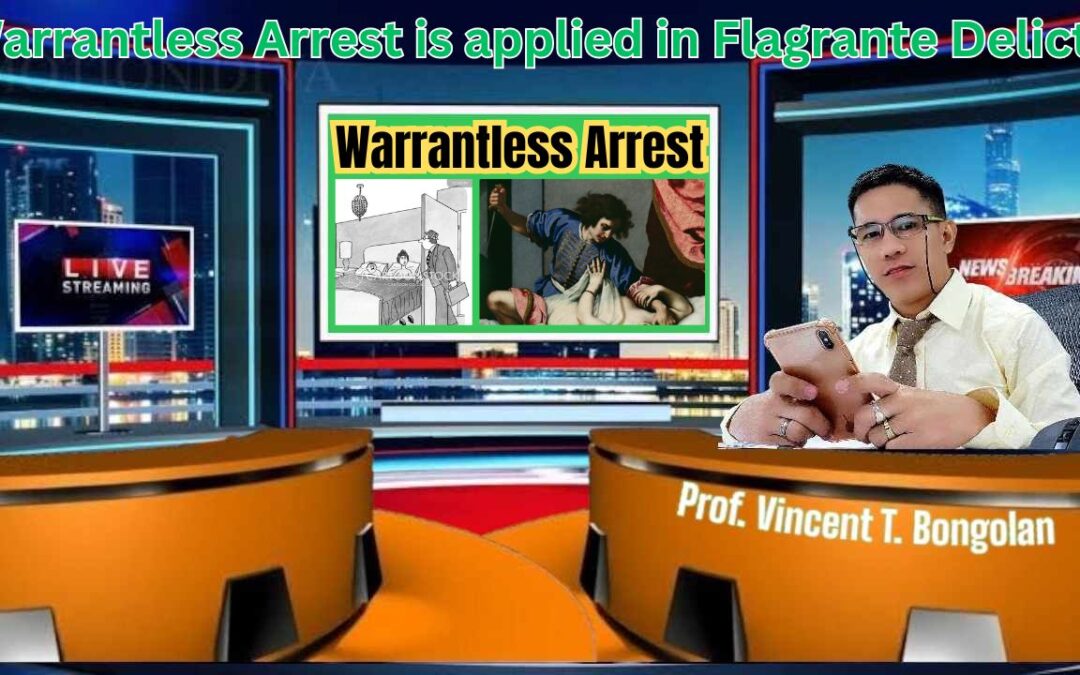Understanding Warrantless Arrest or Citizen’s Arrest in Flagrante Delicto
A warrantless arrest, commonly referred to as a citizen’s arrest, occurs when law enforcement officers or private individuals apprehend a suspect without a court-issued warrant. This legal provision is allowed under specific circumstances, primarily when a crime is being committed in real-time. The Latin term “in flagrante delicto” means “caught in the act,” referring to situations where the suspect is observed directly engaging in a criminal act. In many legal systems, including the Philippines under Rule 113, Section 5 of the Revised Rules of Criminal Procedure, warrantless arrests are justified when a person is committing, has just committed, or is attempting to commit a crime. Law enforcement officers, as well as ordinary citizens, have the legal authority to detain the suspect, provided that they comply with procedural safeguards to prevent abuse.
In cases of in flagrante delicto, immediate action is required to prevent the suspect from escaping, destroying evidence, or causing further harm. Law enforcement officials do not need prior judicial approval to intervene, as their observation of the crime itself serves as sufficient justification for the arrest. This principle ensures swift action against offenders, particularly in crimes involving theft, assault, or other violent offenses. For example, if a person is seen breaking into a store, a police officer or even a concerned citizen can intervene and detain the individual until authorities formally take over. However, while citizens are legally allowed to conduct a warrantless arrest, they are required to turn over the suspect to law enforcement immediately to prevent potential misuse of authority.
Despite its legal justification, warrantless arrests carry certain risks and limitations. There have been instances where wrongful apprehensions have led to legal disputes, with individuals suing for unlawful detention. This is why law enforcement officers must follow strict procedures, ensuring that they have clear evidence or direct observation before making an arrest. Additionally, in some jurisdictions, excessive force during a citizen’s arrest may result in legal consequences for the arresting individual. Proper documentation and swift handover of the suspect to the police help prevent claims of illegal detention, making adherence to due process crucial in warrantless arrest cases.
The principle of citizen’s arrest in flagrante delicto plays a significant role in public safety and crime prevention. While law enforcement officers are primarily responsible for maintaining order, private individuals also have a civic duty to assist in preventing crime when necessary. This legal provision serves as a deterrent, as criminals are aware that they can be apprehended immediately if caught red-handed. However, civilians must exercise caution when making an arrest, prioritizing their own safety and avoiding unnecessary confrontations. In cases of violent crimes, it is always advisable to call law enforcement rather than attempting to subdue the suspect alone.
In conclusion, warrantless arrests under in flagrante delicto are an essential legal mechanism, ensuring that criminals do not evade justice due to procedural delays. However, this power must be exercised responsibly to prevent abuse, false arrests, or unnecessary harm. Law enforcement officers are trained to handle such situations professionally, but ordinary citizens must also be aware of their rights and limitations when making an arrest. Public education on legal provisions surrounding warrantless arrests can help strike a balance between upholding justice and protecting individuals from potential legal repercussions.
Misinterpretation of Warrantless Arrest in Flagrante Delicto by Congresswoman Gerville Jinky “Bitrics” Luistro
Congresswoman Gerville Jinky “Bitrics” Luistro, a lawyer from Batangas, has expressed strong opinions regarding the proliferation of fake news by vloggers. She argues that many vloggers recklessly post false information, misleading the public and damaging reputations without considering the consequences of their actions. She also questions why authorities are not applying warrantless arrest in cases where vloggers are caught red-handed spreading misinformation. However, her interpretation of warrantless arrest in flagrante delicto may not align with legal definitions, as the act of posting fake news does not always constitute an immediate, observable crime that justifies an arrest without a warrant. While spreading false information can be considered unlawful, the law requires that certain elements be met before a person can be arrested in flagrante delicto.
The doctrine of warrantless arrest under in flagrante delicto applies strictly to situations where a person is caught committing a crime in real-time. It is typically used in cases such as theft, assault, illegal drug possession, or acts of terrorism, where law enforcement officers directly witness the crime occurring. In contrast, posting fake news online is not always an instantaneous act that can be physically observed in progress. Even if a vlogger publishes misleading or defamatory content, it is often difficult to determine the exact moment the crime is committed. Moreover, authorities must conduct an investigation to establish intent, verify the accuracy of the content, and determine the harm caused before making an arrest. Therefore, applying in flagrante delicto to fake news cases is not as straightforward as Congresswoman Luistro suggests.
Another key issue in Atty. Luistro’s argument is the challenge of determining what qualifies as “fake news” and whether it constitutes an arrestable offense. Fake news laws in various countries, including the Philippines, require careful legal interpretation, evidence gathering, and due process before an individual can be held accountable. Many vloggers operate under the protection of freedom of speech and press, and while this freedom is not absolute, authorities cannot arbitrarily arrest individuals for expressing opinions that some may consider misleading. To justify a warrantless arrest, the government must prove immediate and direct harm, such as inciting violence or endangering national security, rather than simply posting incorrect or misleading content. This raises concerns that misusing in flagrante delicto for fake news cases could lead to censorship and potential violations of constitutional rights.
Furthermore, law enforcement agencies cannot simply arrest vloggers without a proper legal basis, as doing so would set a dangerous precedent for suppressing freedom of expression. If authorities were to act on Luistro’s interpretation, it could result in abuse of power, where individuals critical of the government or certain public figures could be targeted under the guise of combating fake news. In many cases, addressing misinformation requires fact-checking, legal complaints, or court proceedings, rather than immediate arrests. Instead of calling for warrantless arrests, a more effective approach would be to strengthen cyber laws, promote digital literacy, and enforce strict but fair penalties against proven cases of malicious disinformation.
In conclusion, Congresswoman Gerville Jinky “Bitrics” Luistro’s interpretation of warrantless arrest in flagrante delicto appears legally flawed when applied to vloggers posting fake news. While misinformation is a serious issue that requires urgent attention, the immediate application of warrantless arrests is not a legally sound or practical solution. A more balanced approach would involve due process, legal reforms, and public awareness rather than misapplying criminal procedures that are meant for direct and observable crimes. Authorities must uphold the rule of law and constitutional rights, ensuring that any actions taken against vloggers spreading false information are legally justified, fair, and in accordance with democratic principles.
Strengthening the Unfair Collection Practices Law: A Call for Legislative Action
The Unfair Collection Practices Law and Memorandum Circular No. 18, Series of 2019 were enacted to protect borrowers from abusive, unethical, and excessive debt collection tactics. However, the current legal framework remains insufficient in shielding credit card borrowers, bank borrowers, and other debtors from relentless harassment by collection agencies. It is crucial for lawmakers and Congress to strengthen existing regulations and introduce stricter penalties against financial institutions and collection agencies that engage in aggressive collection practices. Borrowers who are unable to pay their debts are not criminals—they are individuals struggling with financial hardships due to job loss, insufficient income, or economic downturns. Most borrowers do not intend to evade their obligations; they simply lack the means to settle their debts. Thus, the law must recognize their situation and offer a fair and humane approach to debt collection.
Once an account is endorsed to a collection agency, borrowers often face extreme psychological distress due to constant harassment via calls, SMS, and even social media messages. Collection agencies bombard them with reminders almost every minute, sometimes calling late at night or early in the morning, disrupting their peace of mind and daily lives. Instead of helping them find solutions, these collection agencies worsen their mental and emotional struggles, pushing them further into despair. Strengthening the Unfair Collection Practices Law should include provisions that prohibit excessive and intrusive collection methods, set strict time limits for collection calls, and impose harsher penalties on agencies that violate these regulations. Additionally, the law should establish alternative payment options and restructuring programs that will allow borrowers to gradually settle their debts without fear of harassment.
For unemployed borrowers actively seeking jobs, constant calls from collection agencies prevent them from securing employment. Many job applicants anticipate calls from potential employers, hoping for an interview or a job offer. However, when their phones ring every three minutes due to debt collection calls, they are unable to distinguish between legitimate job-related calls and collection harassment. This unethical practice not only prevents them from finding work but also prolongs their inability to pay their debts. Congress should pass a law that regulates the frequency of collection calls, ensuring that borrowers have the space and opportunity to recover financially without being overwhelmed by excessive communication from lenders and collection agencies.
Additionally, once a borrower fails to pay a loan, their credit score is ruined, making it impossible to obtain future financing. Worse, their name is reported to the Credit Management Association of the Philippines (CMAP) and other financial institutions, effectively blacklisting them from the financial system. This practice leaves borrowers with no chance to apply for a new loan, start a business, or regain financial stability. Instead of permanently destroying a borrower’s financial reputation, lawmakers should introduce credit rehabilitation programs that allow debtors to gradually restore their creditworthiness. The new law should mandate financial institutions to provide debt recovery programs, temporary credit relief, and financial literacy training, helping borrowers bounce back from financial difficulties rather than being permanently excluded from the banking system.
We urge Congress to take immediate action by strengthening the Unfair Collection Practices Law and passing a bill that prevents harassment, excessive collection practices, and unfair blacklisting of borrowers. The goal of the law should not be to punish people for being financially burdened, but rather to provide them with the necessary support to recover, rebuild their credit, and reintegrate into the financial system. By enacting humane debt collection policies, Congress can protect the rights of borrowers while still ensuring financial institutions receive fair repayment through ethical and regulated means. Let us create a fairer, more compassionate financial system—one that acknowledges the realities of economic struggles while upholding ethical lending and collection practices.

